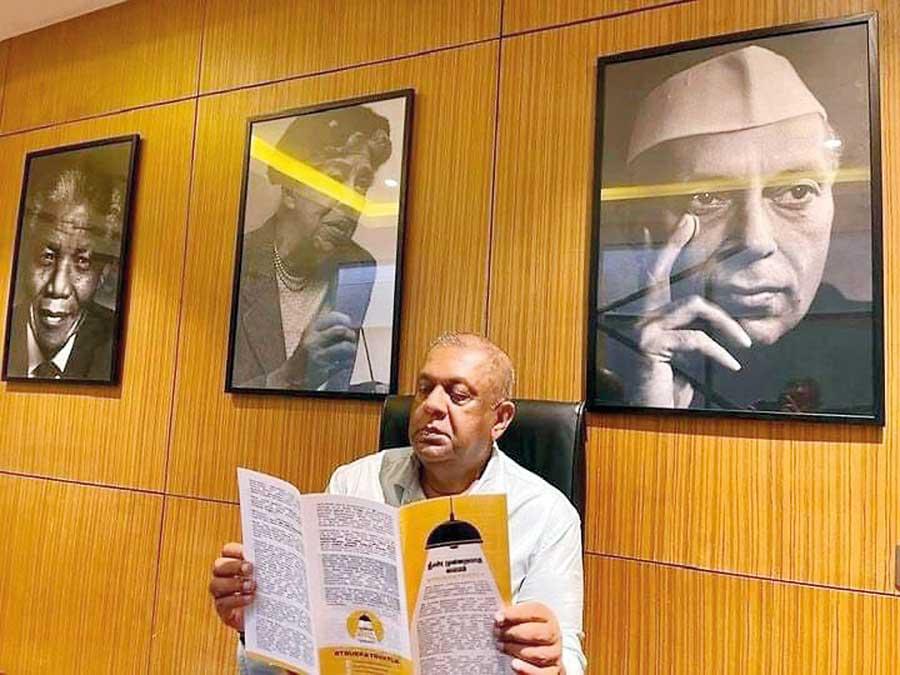Reply To:
Name - Reply Comment
 Mangala Samaraweera, Founder of Radical Centre - True Patriot LK
Mangala Samaraweera, Founder of Radical Centre - True Patriot LK
Image courtesy - True Patriot LK
A Flock to the Centre
If the analysis of the current Sri Lankan regime as being ethno-majoritarian and militaristic holds true, then the SLPP is, by any popular definition, a right-wing political movement. Its economic policy has been decidedly “business friendly” as per the US Department of State Investment Climate Statement of 2021.
For example; the GoSL provided temporary moratoriums for industry specific businesses through the banking system. However, many large conglomerates also benefited, with some genuine SMEs unable to gain clearance and other individuals and proprietorships not even qualifying; “free enterprise for the poor, socialism for the rich” (Gore Vidal).
Another policy; lower consumption taxes and flat(er) tax rates, was meant to increase economic activity but only succeeded in reducing Government revenue to dangerously low levels with little to no ‘trickle down’. At the other end of the SLPP policy spectrum; an organic fertilizer ban and a fuel price hike, both of which are completely disconnected from its own base. So much for right wing populism.
"“It is not Sir that has failed, it is his opinions converted into decisions that have failed”. This statement implies that it was the President’s policies that had failed, not the President himself, a strange and curious distinction to make"
What is the most effective political response to a right-wing movement? President Donald Trump was under constant attack from the liberal media establishment, his term was defined by the pandemic and its resultant human and economic catastrophe. There were allegations of corruption, nepotism, incompetence and even racism, sexism and misogyny. There was leaked audio showing that President Trump knew, very early in 2020, just how severe the virus would become and still downplayed its significance to the American public. There was a tax cut that led to the richest Americans paying significantly less in taxes, with some of the country’s largest corporations, including Amazon, paying no federal taxes at all.
There were over 400,000 American deaths from Covid-19 when President Trump left office and yet in the 2020 election, 12 million more Americans voted for him. His loss was razor thin; around 75,000 votes across 4 states. The crucial point; exit polls suggest that as much as 45% of the Biden vote was actually an anti-Trump vote.
This is what happens when an opposition aims for centrism. The Democrats twice sabotaged the candidate of the left, Senator Bernie Sanders; in 2016 and 2020. Hillary Clinton, the establishment centrist candidate was defeated and President Biden’s win was extremely narrow. Recent internal polling from the Democratic Party found VP Kamala Harris, another centrist, trailing every Republican hopeful for 2024.
Enter the “Maverick”; Mr. Mangala Samaraweera, the former Minister of Finance, with an intervention from what he describes as the “Radical Centre”. His remarks certainly raised an eyebrow; “It is not Sir that has failed, it is his opinions converted into decisions that have failed”. This statement implies that it was the President’s policies that had failed, not the President himself, a strange and curious distinction to make.
"Mr. Samaraweera has contributed significantly to the political careers of former Presidents Chandrika Bandaranaike and Mahinda Rajapaksa as well as ever-present former PM Ranil Wickremesinghe. His comments were deliberate and calculated, surely serving some political end"
Then came the inevitable shots at the Opposition, stating that they had “gone beyond Sir with an ideology containing racism and majoritarianism as a solution”. He did not offer any basis for what is a very serious allegation, one that should never be utilized flippantly. If there was a specific racist statement, policy proposal or even utterance by a mainstream member of the opposition, it should be exposed and condemned.
The ‘Radical Centre’ - True PatriotLK also released a leaflet which begins with a reference to Aristotle before stating the ultimate goal: “a vigorous reiteration of liberal values… a radical centre”. This leaflet is stacked full of buzzwords, truisms and high-minded sentiment but on the national question there is only a vague reference to a “democratic framework of decentralized governance”, which already sounds like a throw-back to the deeply unpopular Ranilist capitulations to the Indo-US axis. Not much mention of how to build a sustainable electoral coalition on such a platform.
Mr. Samaraweera has contributed significantly to the political careers of former Presidents Chandrika Bandaranaike and Mahinda Rajapaksa as well as ever-present former PM Ranil Wickremesinghe. His comments were deliberate and calculated, surely serving some political end.
The Collapse of European Centrism
The poster-boy of modern European centrism, President Emmanuel Macron was initially a member of the French Socialist Party. Yet as Deputy Secretary-General of the Élysée in 2011/2012, he criticized then President Hollande’s proposed tax increase on high income earners as well as personally blocking regulation of CEO pay. The 2018 ‘Yellow Vest’ protest movement, sparked by Macron’s fuel price hike, is further indication of where his centrist compass has led the young French President.
Political Scientist Jean-Yves Camus has noted Macron’s recent hat-tips to France’s right wing, specifically his rhetoric aimed at the country’s significant Muslim population. This includes legislation targeting Islamic face veils. No surprise given Macron does not have any opposition from the Left in 2022; his main challenger will be Marine Le Pen. As at 5th July, average polls show Macron and Le Pen in a dead heat at 25%. Macron’s approval rating was around 35% in March, before climbing to 40% in July.
"If the threat of the SLPP and its alleged project of ethno-fascistic militarism is so dangerous, should not all oppositional elements line up alongside the SJB, the only opposition party with that all important political currency called votes?"
Macron’s predicament highlights the increasing pressures on the political centre throughout Europe. These include Hungary (Fidesz), Poland (Confederation), Austria(!) (Freedom Party) and Switzerland (Swiss Peoples Party). Germany’s mainstream political parties hold a consensus to never cooperate with any party from the country’s Far-Right. However, the Alternative for Germany (AfD) has enjoyed such a resurgence that a Centrist Premier in the state of Thuringia, Thomas Kemmerich, was elected with their support, though he has since resigned under pressure from Chancellor Angela Merkel.
The political survival of the UNP in recent decades, even its sporadic moments as a party of government have been achieved through a bulge from its Colombo base plus significant majorities in the North and the East or through a myriad of political triangulations and partnerships that collapse at the slightest hint of pressure.
This has been the story of Ranil Wickremesinghe’s UNP; unable to build anything more than a fragile coalition, constantly flip-flopping to maintain a flawed and fragile consensus.
As Minister of Finance, Mr. Samaraweera oversaw the rarity of a primary account surplus, but did fiscal conservatism cost the UNP at the polls? Post 2009, Sri Lankans have been fed a diet of visible, tangible development, something lacking during Yahapalanaya. Other difficult decisions which would incur short-term pain for the nation’s eventual gain were put off indefinitely; a sign of the political insecurity that still defines the UNP.
A centrist movement, even with a ‘radical’ label, will only likely succeed in shifting the political needle from the far right to somewhere near the centre. What we are left with then, is plain-old centrism; pragmatism based on appeasement. Not quite the foundation of fundamental change.
Ross Perot, the American billionaire businessman turned Presidential candidate of the 90s, carried the label of Radical Centrist; supporting a balanced budget, increasing taxes on the wealthy while providing tax incentives to business start-ups. Mr. Perot was also protectionist on trade and did not appeal to American Radical Centrist Mathew Miller, who describes him derogatively as a rich, self-financed lone-wolf.
Another centrist; Nick Clegg, was one-time Deputy PM of the UK but is now Vice President for Global Affairs at Facebook, Inc. His party won 57 seats at the 2010 General Election but when it came to governing from the centre, the Lib Dems found themselves constantly caving to the Conservatives. The result was a meagre eight seats at the next election.
The Third Way to Nowhere
The record shows that centrism only survives through dangerous compromises to the right wing. Bill Clinton is also considered a centrist and a proponent of the ‘Third Way’ seeking common ground between the centre-left and centre-right. Mr. Clinton is loved and loathed in equal measure, but left office with strong economic indicators and approval ratings around the 65% mark, reaching the lofty heights of Presidents Reagan and FDR.
With the benefit of hindsight, the Clinton Presidency’s economic policy created very dire effects in later decades. His continuation of Reaganism and its neo-liberal policies including the now reviled NAFTA and the resultant outsourcing of US manufacturing. As part of his ‘triangulations’, Mr. Clinton also agreed to make cuts to welfare and other social programmes, while also signing the repeal of financial industry regulatory act Glass-Steagall, thought to be a catalyst for the 2008 financial crash.
There was a 2018 policy paper, “The Center can Hold – Public Policy for an Age of Extremes” by American think-tank the Niskanen Center, which itself is named after a former economic advisor to President Reagan. Niskanen’s initial staff consisted of ex-members of the Cato Institute, a Libertarian think-tank. Renowned linguist and cognitive psychologist Prof. Steven Pinker of Harvard University was promoting this policy paper with the following tweet:
“Are you frustrated with the stale ideologies and mutual demonization of the Left and Right? Here’s a manifesto for Radical Centrism, Liberal-tarianism, Bold Moderation, an Open Society, smart regulation, and a liberal democratic capitalist welfare state.”
This is the very definition of a word salad, full of oxy-morons and platitudes, revealing the fundamental deficiency of centrism; an unwillingness to state its principles, leading to inevitable appeasement of and capitulation to the right wing. Mr. Samaraweera’s comments are gifts to an SLPP regime desperate for any distraction from its multiple failures. He must surely have noticed that whatever Colombo base the UNP once had has since been swallowed whole by the SJB and by the Opposition Leader himself.
If the threat of the SLPP and its alleged project of ethno-fascistic militarism is so dangerous, should not all oppositional elements line up alongside the SJB, the only opposition party with that all important political currency called votes?
Sri Lanka is crying out for an ideology of policy positions that might construct a more stable and progressive majority. Given the electoral results in the diverse Colombo district, racism and majoritarianism are not valid critiques of the SJB. What Sajith Premadasa and the SJB must offer is a break from the UNP, away from centre-right neo-liberalism. If the SJB participates in a politics of appeasement and incrementalism, Sri Lanka will be stuck with the same centre-right/ centre-left compromises that only appeal to the liberal sentiments of Colombo’s social justice warriors, paying nothing more than lip-service to minority rights. This is the same ideology that had led to the UNP’s total collapse.
Kusum Wijetilleke
The writer is reading for a PhD in International Relations at the University of Colombo and has 15 years experience in the banking industry and travel sector as well as being a student of International Relations and American Politics with a Master of Arts Degree from the University of Colombo and a Joint Honours Bachelor's Degree from the University of Kent.